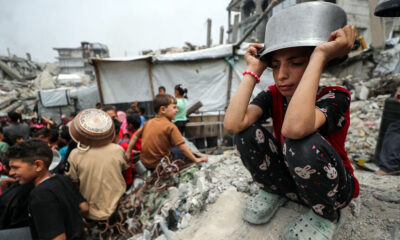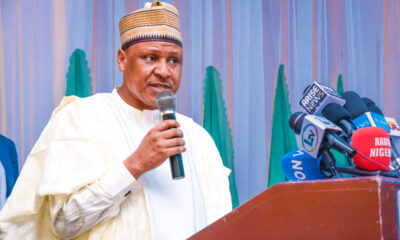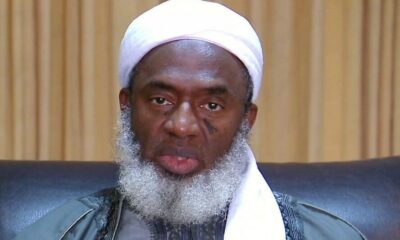International
Many killed, 100 wounded as Israel airstrikes hit Beirut
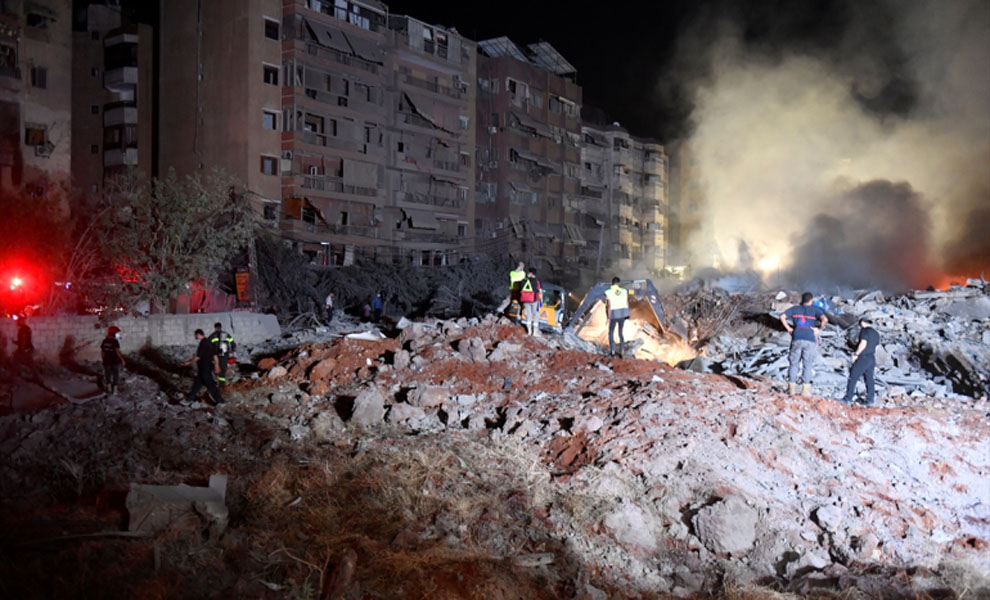
Many killed, 100 wounded as Israel airstrikes hit Beirut
BEIRUT/DUBAI/LONDON: A series of Israeli airstrikes rocked Beirut’s southern suburbs on Friday evening, erasing a residential block in the Haret Hreik neighborhood and reverberating across the Lebanese capital, rattling windows and sending a thick plume of dark smoke into the sky.
The Israeli army’s spokesperson Daniel Hagari claimed the “precise strikes” hit the central headquarters of the Iran-backed group Hezbollah, believed to be located beneath residential buildings, the AP news agency reported.
The blasts caused nationwide panic and plunged the surrounding area into chaos. Paramedics from Hezbollah’s Islamic Health Authority rushed to the scene alongside relatives of the buildings’ residents.
Others in the southern suburbs rushed into their cars and fled towards Beirut and Mount Lebanon.
Lebanon’s Health Minister Firas Abiad confirmed that “some of the targeted buildings were inhabited.”
At least two people have been killed, and hospitals in the area received more than 50 wounded from nearby buildings, including three in critical condition. Rescue teams urgently appealed for blood donations.
The Lebanese state-run National News Agency said six tall buildings in Haret Hreik have been reduced to rubble in the biggest blast to hit the capital in the past year.
Targeting Hezbollah’s secretary-general, Hassan Nasrallah, who was suspected to be in a bunker underneath the buildings, the Israeli military used F-35 aircraft and dropped 2,000 tons of explosives on the area, according to Israeli media.
Mohanad Hage Ali, the deputy director for research at the Malcolm H. Kerr Carnegie Middle East Center, told Arab News that “Israel has moved from the precision killings phase into dynamite or blast fishing; the end justifies the means.”
READ ALSO:
- Halt Mideast crisis now, Saudi urges UN Security Council
- Israel will continue attacks on Gaza, Lebanon, Netanyahu tells UN
- Igbo politicians have become mere breadwinners – Obidigbo
“They can kill hundreds to reach a target,” he continued. “This is why it is more likely a high-value target was there (in the targeted block) – this is why they (the Israeli military) took the decision.”
Israeli broadcaster Kan 11 initially reported an on-screen headline saying Nasrallah was “harmed,” but quickly followed with Israeli assessments indicating he is dead.
However, the Iranian news agency Tasnim reported that a security source confirmed Hezbollah chief Hassan Nasrallah and the group’s executive council head, Hashim Safi Al-Din, were unharmed.
Iran’s embassy in Beirut described the Israeli strike as a “serious escalation that changes the rules of the game,” threatening that there will be repercussions.
“The Israeli regime once again commits a bloody massacre, targeting heavily populated residential neighborhoods while spewing false justifications to try and cover up its brutal crimes,” the embassy wrote on the social platform X.
“There is no doubt that this reprehensible crime and reckless behavior represent a serious escalation that changes the rules of the game, and that its perpetrator will be punished appropriately.”
Analysts believe the strike on Haret Hreik reflects Israel’s dismissal of traditional wartime norms, marking the start of a new phase in the Israel-Hezbollah conflict.
“Such a strike signals a disregard for the limitations typically observed in warfare, including proportionality and ethical considerations as it is a civil populated area as Tel Aviv a city with military basis,” Rafe Jabari, a researcher on the political sociology of Arab states, told Arab News.
“The scale of the destruction implies that the Israeli government is not constrained by these principles of International Law,” he added.
Jabari also believes “the strategy being employed suggests that Israel believes that war is the solution to end further conflict.”
He explained that “airstrikes are the strategic weapons used by Israel before the invasion of the Lebanese territories as happened in the Gaza Strip.
“The Israeli army is using destruction and terrors to eliminate any opposition to its occupation and colonization policy.”
“However, this approach is wrong,” Jabari continued. “Rather than achieving lasting peace, the continuation of such military actions is likely to provoke further instability and insecurity across the region.”
“Instead of bringing about an end to hostilities, this escalation will fuel the conditions for more wars and destruction in the future including this one.”
READ ALSO:
- Nigeria, UAE seal flight rights deal ahead of Emirates return
- Igbo politicians have become mere breadwinners – Obidigbo43 killed as Hurricane Helene ruins southeast US
- Four journalists remanded for alleged false publication against GTB boss
Likewise, Beirut-based political analyst Nader Ezzedine said: “By targeting Hezbollah chief Hassan Nasrallah, regardless of the outcome, Israel has chosen to break all established conflict rules and red lines that had been observed in its previous wars with Hezbollah.”
He told Arab News that “whether the outcome of this strike results in Nasrallah’s death or his survival, it will have significant ramifications for the conflict.”
“Hezbollah initially tried to adhere to certain rules in the hopes that an agreement can be reached to end the war in Gaza and Lebanon,” he added. “However, after this strike, I no longer believe this war will have any rules or limits.”
However, Ezzeddine believes that while the strike may have dealt a significant blow to Hezbollah and undermined its fighters’ morale, “it will not end the war but will likely intensify the fighting even further.”
“This strike will not end the conflict if Israel aimed to do so by killing Nasrallah,” he said. “Instead, it will certainly cause a huge escalation.”
He also expects this strike to be followed by an Israeli ground invasion, while Hezbollah may escalate its attacks against Israel.
Middle East expert Jabari noted that “we are witnessing an open war worse than the one in 2006. The Israeli army and government are choosing weapons as a means of negotiation instead of political and diplomatic endeavors.”
On Wednesday, Sep. 25, Israel’s military chief Herzi Halevi told troops that its airstrikes in Lebanon aimed to destroy Hezbollah’s infrastructure to pave the way for a possible ground incursion, CNN reported.
These comments came after the Israeli army intercepted a missile that Hezbollah said it had shot at the headquarters of Mossad, Israel’s intelligence agency, near the Israeli city of Tel Aviv.
A day earlier, an Israeli airstrike on Beirut killed senior Hezbollah commander Ibrahim Qubaisi, who reportedly led the group’s missile and rocket force.
Reports of Friday’s strikes came less than an hour after Israeli Prime Minister Benjamin Netanyahu’s address at the UN General Assembly, in which he vowed to continue his military operation in Lebanon despite a US ceasefire proposal demanding a 21-day pause in the fighting between Israel and Hezbollah.
Israel’s onslaught on Lebanon, which it says aims to eliminate Hezbollah, has killed within a few days 720 Lebanese people, many of them women and children, according to Lebanon’s health ministry.
Since October 8, after Israel launched its onslaught on Palestine’s Gaza Strip, Israel and Hezbollah have been exchanging cross-border fire. But in the last week, Israel dramatically intensified its airstrikes in Lebanon, claiming the goal is to end Hezbollah’s 11 months of attacks on its territory.
Many killed, 100 wounded as Israel airstrikes hit Beirut
ARAB NEWS
International
Israel to Revoke Licences of 37 Aid Groups in Gaza, West Bank, Sparks International Outcry
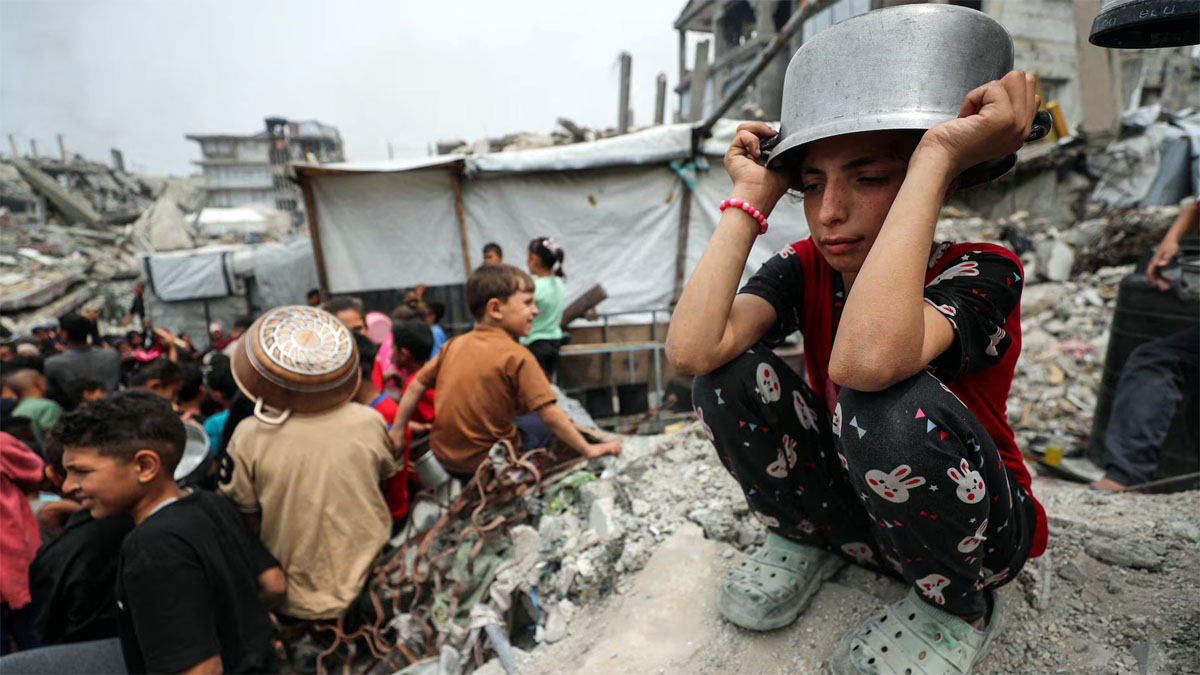
Israel to Revoke Licences of 37 Aid Groups in Gaza, West Bank, Sparks International Outcry
Israel has announced plans to revoke the licences of 37 humanitarian aid organisations operating in Gaza and the occupied West Bank, a move that has drawn sharp criticism from several Western governments and international humanitarian bodies.
The affected organisations include major international non-governmental organisations (INGOs) such as ActionAid, the International Rescue Committee, and the Norwegian Refugee Council, whose licences are set to be suspended from January 1, with their operations expected to wind down within 60 days.
According to Israel’s Ministry of Diaspora Affairs, which oversees the registration of aid groups, the decision followed the organisations’ failure to comply with new registration requirements, including the submission of what it described as “complete and verifiable personal details” of staff members.
The announcement triggered condemnation from the foreign ministers of 10 countries, including the United Kingdom, France, Canada, Japan, Norway and Sweden, who described the new rules as “restrictive” and “unacceptable.” In a joint statement, they warned that shutting down INGO operations would have a severe impact on access to essential services, particularly healthcare, in Gaza.
READ ALSO:
- UNN Students Reject 100% Fee Hike, Insist on Maximum 25% Increase
- Police Arrest 22-Year-Old Over Alleged Rape of Minor in Oyo State
- Army Rescues Over 1,000 Kidnap Victims, Destroys Bandit Camps Across North-West
The ministers stressed that the humanitarian situation in Gaza remains catastrophic and urged the Israeli government to ensure aid organisations can operate in a sustained and predictable manner.
Israel, however, insisted that the move would not disrupt the flow of humanitarian assistance. The Ministry of Diaspora Affairs said aid continues to reach Gaza through approved and vetted channels, including United Nations agencies, bilateral partners and selected humanitarian organisations.
The ministry argued that the licence revocations were necessary to prevent the infiltration of terrorist operatives into humanitarian structures, adding that fewer than 15% of aid organisations were found to be in violation of the new regulatory framework.
Israel’s military coordination body, Cogat, also claimed that the suspended organisations did not deliver aid to Gaza during the current ceasefire, and that their combined contribution previously accounted for about 1% of total aid volumes.
The new framework allows for licence denial on grounds including denying Israel’s existence, denying the Holocaust or the October 7, 2023 Hamas attacks, supporting armed struggle against Israel, promoting delegitimisation campaigns, or calling for a boycott of Israel.
In contrast, the Humanitarian Country Team of the Occupied Palestinian Territory, which represents UN agencies and over 200 local and international organisations, warned that the registration system “fundamentally jeopardises” humanitarian operations in Gaza and the West Bank. The group said the criteria were vague, arbitrary and politicised, making compliance difficult without breaching international humanitarian principles.
The forum noted that INGOs currently support most of Gaza’s field hospitals, primary healthcare centres, emergency shelters, water and sanitation services, and nutrition centres for malnourished children.
Israel’s Minister of Diaspora Affairs and Combating Antisemitism, Amichai Chikli, defended the policy, stating: “Humanitarian assistance is welcome — the exploitation of humanitarian frameworks for terrorism is not.”
Other organisations facing suspension include CARE, Medico International, and Medical Aid for Palestinians.
Israel to Revoke Licences of 37 Aid Groups in Gaza, West Bank, Sparks International Outcry
BBC
International
Zelenskyy Rejects Russia’s Claim of Drone Attack on Putin’s Residence, Warns of Escalation
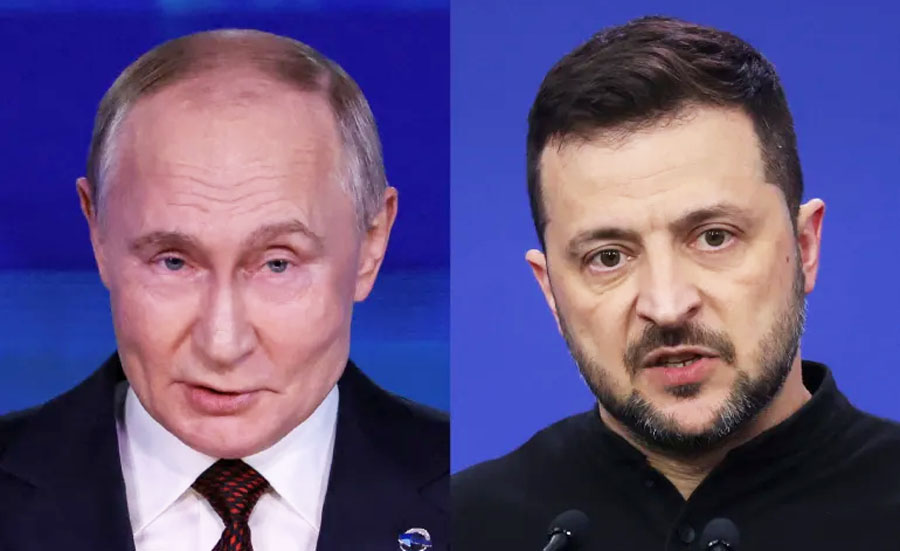
Zelenskyy Rejects Russia’s Claim of Drone Attack on Putin’s Residence, Warns of Escalation
Ukrainian President Volodymyr Zelenskyy has dismissed Russia’s claim that Ukraine launched a drone attack on a residence belonging to Russian President Vladimir Putin, describing the allegation as a fabrication that could be used to justify further military escalation.
Russia’s Foreign Minister Sergei Lavrov alleged that 91 long-range drones were launched overnight on Sunday at Putin’s state residence in the Novgorod region, northwest Russia. According to Moscow, all the unmanned aerial vehicles (UAVs) were intercepted by Russian air defences, with no casualties or damage recorded. The Kremlin did not clarify whether Putin was present at the location at the time.
Responding on Monday, Zelenskyy described the accusation as “typical Russian lies,” warning that it could serve as a pretext for intensified attacks on Ukraine and a hardening of Russia’s stance in ongoing peace negotiations.
“Everyone must be vigilant now. Absolutely everyone. A strike may be launched on the capital,” Zelenskyy told journalists, calling Russia’s statement a “threat” and accusing Moscow of seeking excuses to prolong the war.
In a post on X, the Ukrainian leader urged the international community not to remain silent, warning that Russia must not be allowed to sabotage efforts toward a lasting ceasefire.
READ ALSO:
- Amotekun Arrests 39 Suspected Terrorists Fleeing Sokoto After US Airstrikes
- Nigeria vs Uganda: Key Super Eagles Players Risk Suspension Ahead of AFCON Clash
- Malami, Son, Wife Remanded Over ₦Billions Money Laundering Charges
Lavrov, in a statement published on Telegram, said Moscow would reconsider its negotiating position, citing what he termed the “final degeneration” of Ukraine’s leadership. However, he said Russia would not withdraw from talks with the United States, according to Russian news agency Tass.
On Tuesday, the Kremlin said it would not provide evidence to support its claim, with a spokesperson confirming that Russia would now “toughen” its negotiating stance.
Ukraine’s Foreign Minister Andrii Sybiha rejected the allegation, insisting that Russia had failed to present any credible proof.
“Almost a day has passed, and Russia still hasn’t provided any plausible evidence to its accusations of Ukraine’s alleged attack on Putin’s residence. And they won’t — because there is none,” Sybiha wrote on X.
The controversy follows US-Ukraine talks in Florida on Sunday, where US President Donald Trump and Zelenskyy discussed a revised peace plan. Zelenskyy later told Fox News that there was a “possibility to end the war in 2026,” stressing that Ukraine would require continued US support.
He disclosed that Washington had proposed 15-year security guarantees, with Trump saying negotiations were “95 per cent complete.” Zelenskyy identified territorial disputes, the Russian-occupied Zaporizhzhia nuclear power plant, and unresolved issues in the Donbas region as major sticking points.
The White House confirmed that Trump held what it described as a “positive call” with Putin following the US-Ukraine talks. Kremlin aide Yuri Ushakov said Putin raised the alleged drone incident during the conversation, claiming it occurred shortly after what Washington viewed as a successful diplomatic engagement.
Trump later told reporters he was informed of the incident by Putin and was “very angry,” though he acknowledged that it was also possible the attack had not occurred.
Zelenskyy Rejects Russia’s Claim of Drone Attack on Putin’s Residence, Warns of Escalation
International
China Stages Record Military Exercises Around Taiwan Amid US Arms Deal
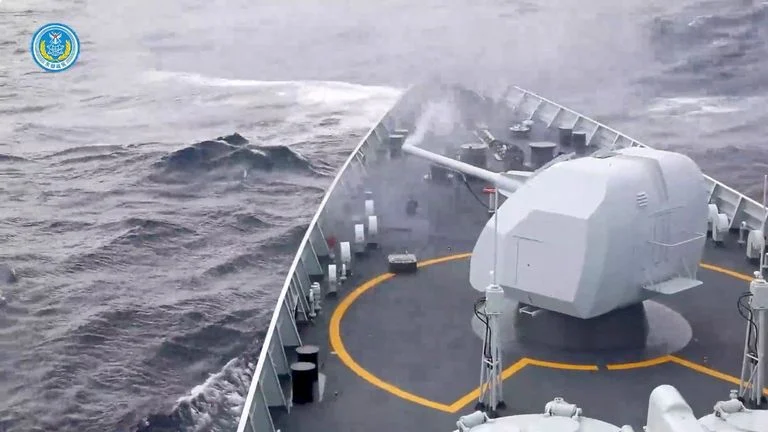
China Stages Record Military Exercises Around Taiwan Amid US Arms Deal
China on Tuesday deployed warships, fighter jets and artillery units in its largest-ever military exercises around Taiwan, simulating a full blockade of the self-governed island amid rising regional tensions.
The drills, codenamed “Justice Mission 2025,” involved China’s army, navy, air force and rocket force, and featured live-fire exercises, simulated strikes on land and sea targets, and coordinated operations aimed at sealing off Taiwan’s ports and surrounding airspace.
China’s Eastern Theater Command, which oversees operations in the Taiwan Strait, said the exercises were intended to deter what it described as “separatist forces” in Taiwan and “external interference.” Beijing’s foreign ministry characterised the drills as a “severe punishment” for pro-independence elements and warned outside powers against “using Taiwan to contain China.”
State media released footage of Chinese warships, combat aircraft and artillery units mobilising across multiple zones encircling Taiwan. China’s Maritime Safety Administration designated a record seven live-fire zones, covering a wider area and operating closer to Taiwan than in previous drills.
READ ALSO:
- Niger Delta Crackdown: Army Seizes ₦150m Stolen Oil, Arrests 19 Suspects
- I Won’t Be Anyone’s Running Mate in 2027 — Peter Obi
- Anthony Joshua injured as two die in fatal Lagos-Ibadan Expressway crash (plus photos)
The exercises come days after the United States approved an $11.1bn arms package for Taiwan, prompting strong protests from Beijing and sanctions against US defence companies. Analysts say the timing signals China’s intent to send a firm warning to both Taipei and Washington.
Taiwan’s presidential office condemned the drills, describing them as a threat to regional stability and international norms. The island’s defence ministry said it detected dozens of Chinese military aircraft and vessels operating around Taiwan and placed its forces on high alert, deploying aircraft, naval units and missile systems.
“Our armed forces are prepared for the worst and must consider every possible scenario,” a senior Taiwanese defence official said, warning that live-fire drills in the Taiwan Strait pose risks to neighbouring countries as well as international shipping and aviation.
Taiwan’s aviation authority said flights were being rerouted after China declared temporary danger zones, while the coast guard deployed large patrol vessels to monitor Chinese ships near Taiwan’s waters.
China has accused Taiwan President Lai Ching-te of pursuing independence, a claim he denies. Lai maintains that Taiwan is already a sovereign state and says his administration seeks to preserve the status quo while strengthening the island’s defences. Polls consistently show that most Taiwanese favour maintaining the current situation.
Since 2022, China has intensified military pressure on Taiwan, staging repeated large-scale drills in response to what it views as provocative actions, including closer US–Taiwan security ties. The latest manoeuvres mark the sixth major exercise since then and the first under Eastern Theater Command commander Yang Zhibin.
Chinese media said the drills were designed to demonstrate Beijing’s ability to cut Taiwan off from external support, with emphasis on blocking deep-water ports and key supply routes, while showcasing advanced systems such as drones and robotic platforms.
China Stages Record Military Exercises Around Taiwan Amid US Arms Deal
-

 metro3 days ago
metro3 days agoIbadan Explosion: Fayose Releases Documents, Claims Makinde Got ₦50bn from FG
-
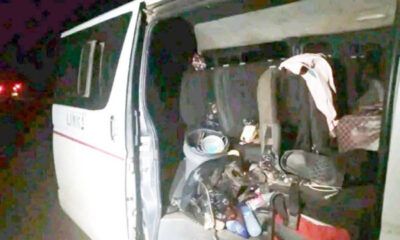
 metro3 days ago
metro3 days agoPlateau Kidnappers Demand ₦1.5m Each as 28 Muslim Travellers Remain in Captivity
-

 metro2 days ago
metro2 days agoNiger Delta Crackdown: Army Seizes ₦150m Stolen Oil, Arrests 19 Suspects
-

 Sports2 days ago
Sports2 days agoAnthony Joshua injured as two die in fatal Lagos-Ibadan Expressway crash (plus photos)
-

 Sports2 days ago
Sports2 days agoCristiano Ronaldo Wins Best Middle East Player at 2025 Globe Soccer Awards in Dubai
-

 metro21 hours ago
metro21 hours agoMrs. Regina Akume Urges SGF George Akume to Return to Christianity Amid New Marriage
-

 metro1 day ago
metro1 day agoTwo Close Aides of Anthony Joshua Identified as Victims of Fatal Crash
-

 metro1 day ago
metro1 day agoOgun Man Arrested After ₦4,000 Debt Dispute Claims Stepbrother’s Life



